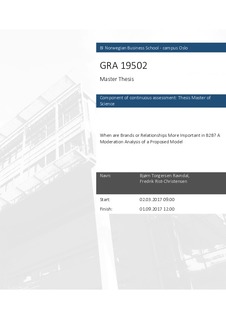When are brands or relationships more important in B2B? : A moderation analysis of a proposed model
Master thesis
Permanent lenke
http://hdl.handle.net/11250/2469548Utgivelsesdato
2017Metadata
Vis full innførselSamlinger
- Master of Science [1621]
Sammendrag
Although recent B2B marketing research suggest that branding and
relationships are of importance to firm performance, no research examines how
these constructs act in the same model. We try to merge these two streams of
literature by 1) proposing a model wherein branding and relationships are included
as independent variables predicting the dependent variable share of wallet (SOW),
2) testing whether these constructs substitute each other depending on the context
of the transaction, and 3) testing the moderating effects of purchase characteristics,
relationship characteristics, buyer characteristics, and market characteristics.
Our email survey collects qualitative and quantitative data among 131
Norwegian firms’ purchasing managers across different industries. Given the
relatively small data set of complete responses, we conduct a PLS-SEM analysis
using the SmartPLS 3 (Ringle, Wende and Becker 2015) software.
Our findings cannot substantially support that there exists a substitution
effect between brand and relationships as we are unable to confirm the related
hypotheses. Despite the lack of evidence regarding substitution, we do find
significant main effects of brand knowledge and relationship quality on SOW. The
most important contribution of this study is the five moderating effects. First, when
customer-perceived value (CPV) is high, relationship quality has a larger effect on
SOW. Second, when relationship specific investments (RSI) are high, relationship
quality has a larger effect on SOW. Third, when buying center heterogeneity (BCH)
is high, relationship quality has a larger effect on SOW. Fourth, when buying center
time pressure (BCTP) is high, brand has a smaller effect on SOW. Finally, brand
has a larger effect on SOW for services than for products.
We argue that our study has important theoretical and managerial
implications as we are among the first to align relationship marketing and brand
management research in the B2B field. We also suggest several future research
directions.
Keywords: B2B marketing, brand awareness, brand image, brand
knowledge, brand identification, partial least squares structural equation modeling
(PLS-SEM), relationship commitment, relationship trust, relationship satisfaction,
relationship quality, service quality, share of wallet (SOW).
Beskrivelse
Masteroppgave(MSc) in Master of Science in Business, Marketing - Handelshøyskolen BI, 2017
